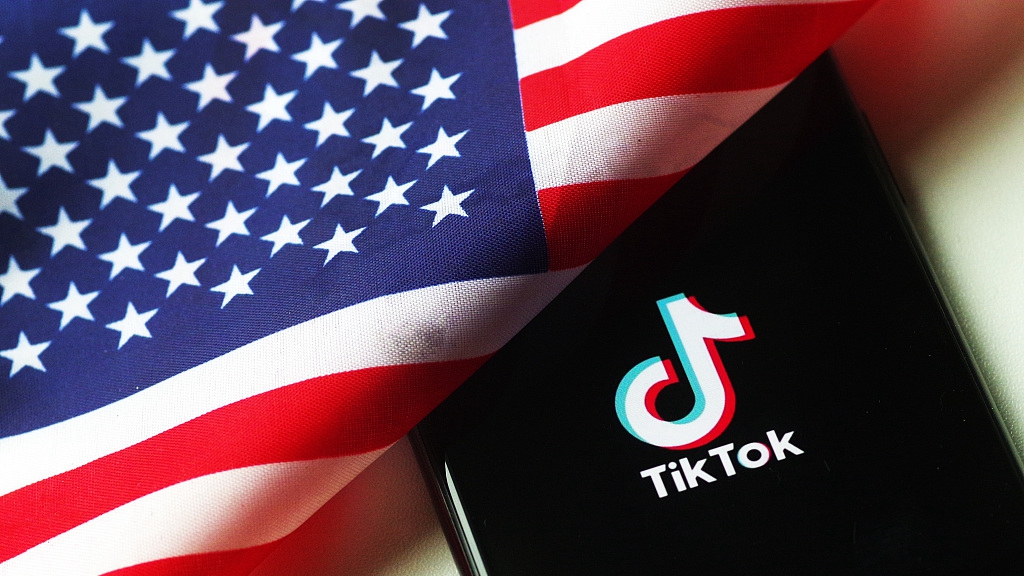
Editor's note: Tom Fowdy is a British political and international relations analyst and a graduate of Durham and Oxford universities. He writes on topics pertaining to China, the DPRK, Britain and the U.S. The article reflects the author's opinions and not necessarily the views of CGTN.
On the evening of July 31, while aboard Air Force One, U.S. President Donald Trump told reporters he was banning TikTok via executive order. Although he did not give the details, the comments come amid repeated speculation in the media that the company is in talks with tech giant Microsoft to divest its U.S. operations.
Later, on August 1, Reuters claimed that a deal had been reached, although its details are scant and still developing. While TikTok's official stance is that it does not comment on rumors, its CEO, Kevin Mayer, however, was more upbeat, insisting that the application was "here to stay."
Irrespective of the outcome, one point stands: The White House has effectively bullied another Chinese technology company out of the American market on premises that are dubious at best and unproven.
While it should be noted that Trump's push for an outright ban is likely to be a negotiating tactic, the idea that a children's video application is somehow a threat to national security is opportunistic at best and at worst laughable.
Despite a Congressional hearing just days ago on the so-called vices of U.S. big tech dominating the market, it is quite obvious that the Trump administration is seeking to maintain the absolute monopoly of American technology companies within world markets at all costs. If a firm is associated with China, they are simply guilty as charged.
In reporting the TikTok saga, mainstream media news outlets such as the BBC have been too happy and too eager to present the U.S. narrative on the application as sincere, repeatedly stating that officials in the country expressed "concerns" on its use of data and China's government while failing to offer any counterpoint or critique of what clearly constitutes obvious opportunism.
These alleged "concerns" are not actually built on any serious empirical evidence at all but rather a guilt by association premise that the owners of the application are Chinese; therefore, they constitute a "threat." A similar logic was applied to the popular LGBT dating application Grindr, which was also owned by a Chinese company until it was forced to divest.
Although one can never tell with Trump, this is likely to be the eventual outcome here. The idea of the president indiscriminately banning a popular application with over 80 million users on questionable political grounds is likely to generate large scale discontent, especially among young people. The move comes across as petty, vindictive and bitter.
As a result, his threats to ban it are likely to be, even if imposed initially, a negotiating tactic to force Bytedance to sell the application, a very much textbook Trump "art of the deal" move, whereby he threatens to accumulate leverage over a particular target in the goal of pressuring them into handing him a zero-sum result in his own favor.

The headquarters of ByteDance Ltd., a Chinese multinational internet technology company in Beijing, August 8, 2018. /VCG
The headquarters of ByteDance Ltd., a Chinese multinational internet technology company in Beijing, August 8, 2018. /VCG
Talk of a ban is designed to hasten the divestment talks and force TikTok to lower its negotiating price in desperation, again very common "Trumpian" tactics.
Of course, the bigger picture here is how the president is utilizing coercion to sustain an American global monopoly over technology at all costs. If Chinese technology companies have global ambitions, this is ultimately a turbulent time for them, for it appears that every time a certain firm or application passes a particular global level of prominence, it now faces open campaigning against it, threats and attempts by the U.S. government to put it out of business.
If Tiktok is being challenged, then one must question "what won't be?"– nothing seems to be out of bounds. There is a state of mind that any sort of competition or threat to America's hold over these markets must be extinguished, forcefully.
The "fear" tactic used against these companies stems from inherent political and economic motivations, and mainstream media fails to give scope to the fact that these anti-Chinese tech campaigns are not driven by facts, fairness or purity but constitute naked cynical politics.
In this case, the TikTok saga is a perfect rendition of Trump's mindset when it comes both to business and America's hegemony in the world, and competitors ought to be undermined by force and the threat of force alike.
The company's days in the American market are numbered. Ultimately, Bytedance's best hope is that it can push through a deal that rewards it for its success in creating the currently most downloaded application in the world. It must not let obvious smear politics weigh on its success, nor should it allow Trumpian "art of the deal" threats to lower its price in desperation.
Sharing sovereignty with an American co-owner is not the worst outcome, nor is it a fair one given the circumstances.
(If you want to contribute and have specific expertise, please contact us at opinions@cgtn.com.)